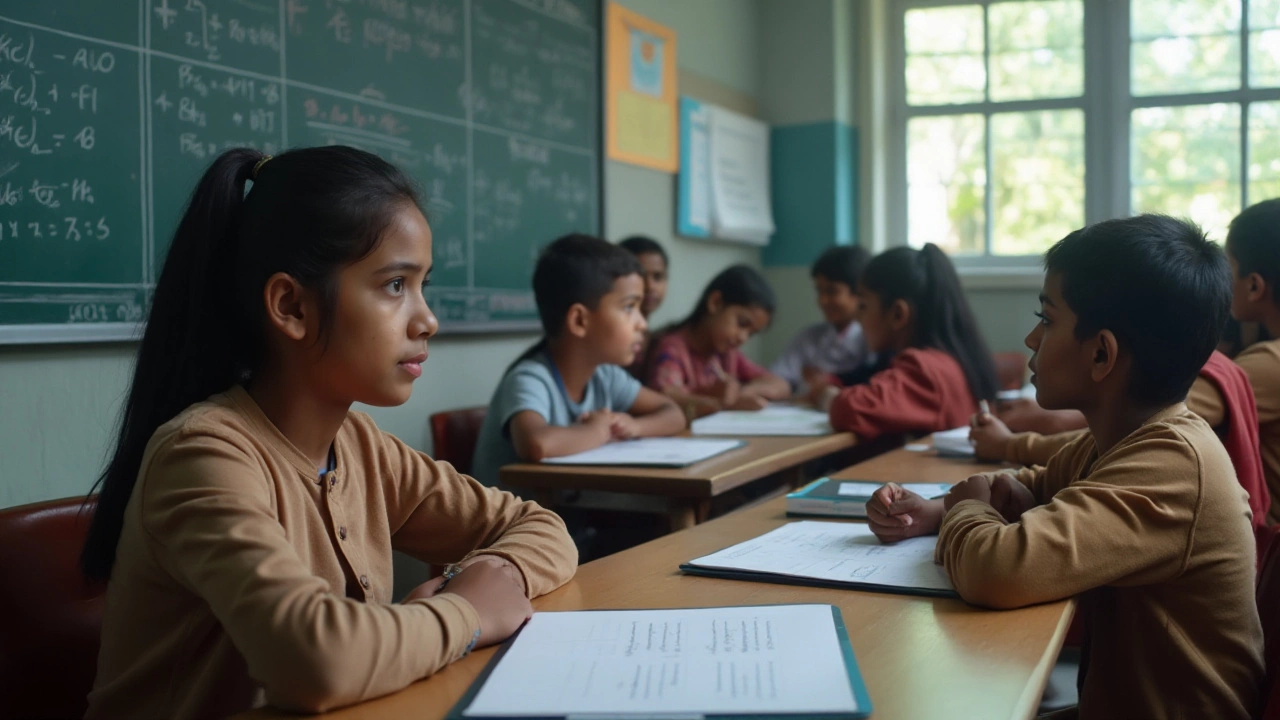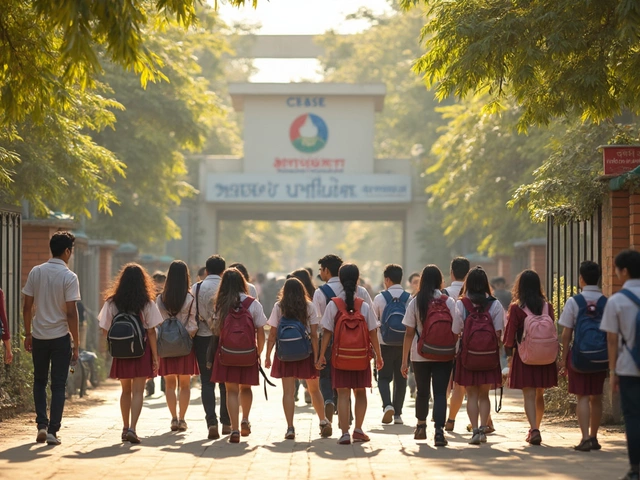The Central Board of Secondary Education, commonly known as CBSE, stands as a giant in the educational landscape of India. Renowned for its rigorous and well-structured curriculum, CBSE prepares students for both national and international platforms. But what makes it regarded as the hardest board by many?
In this article, we dive deep into the factors that contribute to CBSE's reputation. From its diverse syllabus to the pressure of maintaining high academic standards, we will unravel the elements that students need to tackle head-on. For those navigating or about to embark on this academic journey, understanding these aspects can be a valuable compass.
- Understanding the CBSE Board
- Syllabus Complexity
- Comparison with Other Boards
- Student Success Stories
- Study Tips and Resources
- Future Prospects for CBSE Students
Understanding the CBSE Board
The CBSE syllabus is well-known for its expansive approach to educational content, drawing upon a variety of disciplines to offer a cohesive learning experience. Established in 1962, the Central Board of Secondary Education operates under the Government of India. It sets guidelines and frameworks primarily aimed at benefiting Indian students across the country as well as overseas. One of the core strengths of the CBSE lies in its focus on application-based learning. Students are encouraged to explore topics beyond mere theoretical discussions, which often pushes them to engage with the material on a deeper level.
With a structured curriculum that includes mandatory subjects like Mathematics, Science, and English, CBSE ensures that learners get a balanced and comprehensive education. The board’s emphasis is not restricted to theoretical knowledge but extends to practical exposure, project work, and internal assessments. Take, for example, the way CBSE integrates multimedia resources and digital tools into classrooms, keeping pace with global educational trends. This forward-thinking approach helps prepare students for competitive exams like JEE and NEET, giving them an edge in the race for top-tier university placements.
Moreover, the board fosters a multi-faceted development ethos, promoting extracurricular activities and sports. This holistic perspective not only aims at academic proficiency but also the cultivation of essential life skills, such as leadership and collaboration. There have been recent revisions to the curriculum to include critical life skills and value education; a move hailed by educators and parents alike. According to the National Council of Educational Research and Training, "such changes arm students with skills that are indispensable in today's fast-evolving work environment."
"CBSE is not merely about churning out rote learners; it’s about molding thinkers who question and investigate," notes a prominent educationist, Professor Shalini Agrawal.
Statistics from the last academic cycle illustrate a rise in the number of students achieving distinction. A survey highlighted that approximately 85% of CBSE students felt better prepared for higher education challenges compared to their peers from other boards. While the board has often been tagged as difficult due to its demand for high academic standards, those who have journeyed through it frequently regard it as a thorough groundwork for further academic and professional endeavors.
For parents and students, an understanding of the CBSE’s operational mechanics is paramount. The board conducts annual examinations for 10th and 12th standards, which serve as pivotal points in a student's academic timeline. Given the breadth of the CBSE syllabus, students must focus on effective time management and utilize resources such as previous years' question papers and model test papers. Such strategies not only aid in grasping the exam patterns but also in refining problem-solving skills. The end goal remains consistent: to turn students into lifelong learners capable of analytical and innovative thought processes.
Syllabus Complexity
The CBSE syllabus is often considered a labyrinth of academic rigor, designed to nurture a well-rounded intellect among students. Unlike many educational boards that tend to spoon-feed students with narrowly focused content, CBSE emphasizes analytical thinking and comprehensive understanding. The roots of its complexity lie in the depth and breadth of topics covered, which encourage students to engage deeply rather than just scrape the surface.
One key factor contributing to this is the board's insistence on thorough coverage of the core subjects. Each subject, whether it's Mathematics, Science, or Humanities, is tackled with a multi-faceted approach. For instance, in subjects like Science, students not only learn theoretical aspects but are also nudged towards practical experimentation, bridging the gap between theory and application. This encourages students to move beyond textbooks and apply what they've learned to real-world scenarios.
Another interesting aspect of the educational board is its methodical layering of topics. Concepts are introduced gradually, with each academic year building upon the foundation laid by the previous one. This requires students to retain and connect information seamlessly, promoting a culture of learning that is cumulative rather than discrete. The benefit is a deeper retention of knowledge, though it does demand consistent effort and motivation from students.
"CBSE has the potential to shape critical thinkers and problem solvers," says Dr. Mehta, an educationist who has studied various curricula. "Its approach to integrating knowledge helps students see the relevance of their studies in everyday life, which is crucial for holistic development."
Moreover, comparing CBSE with other boards uncovers interesting layers of its uniqueness. For instance, unlike some regional boards that may focus heavily on rote memorization, CBSE prioritizes critical evaluation through a variety of assessments. The inclusion of projects, labs, and group activities enhances teamwork and communication skills, often paralleling tasks they might encounter in professional environments later on.
Exceling in the board not only opens doors to prestigious universities in India but also abroad, due to its widespread recognition. Approaching the complexity of CBSE's syllabus, students are advised to utilize resources effectively. This includes additional reference books, online platforms, and engaging with teachers for a broader comprehension. Working through old question papers is another strategy that benefits many, familiarizing students with the exam pattern while honing their time management skills. These tools, together with a focused approach, can transform the rigorous demands of the CBSE syllabus into an enriching educational experience.

Comparison with Other Boards
When discussing the difficulty of the CBSE syllabus, it's essential to compare it with other prominent educational boards like the ICSE, State Boards, and international platforms like IB (International Baccalaureate) and IGCSE. Each board presents its own set of challenges and advantages, thereby catering to different educational needs and aspirations of students.
The ICSE board, managed by the Council for the Indian School Certificate Examinations, is known for its expansive syllabus that encourages an in-depth understanding of subjects. Compared to CBSE, ICSE often includes more comprehensive study materials and detailed assessments, which some believe fosters critical thinking better than the CBSE's relatively structured yet concise curriculum. However, these intricate details can at times overwhelm students unaccustomed to intensive study routines.
State Boards, on the other hand, vary across each Indian state, offering regional languages and localized content. They usually prioritize rote learning over understanding concepts, although this has been evolving. While State Boards might seem less challenging in this regard, students often face hurdles when transitioning to national and international examinations due to less exposure to the competitive patterns found in CBSE and IB curricula. This divergence can create discrepancies in students' preparation for higher studies unless supported by supplementary coaching.
The International Baccalaureate and IGCSE boards are globally recognized, emphasizing analytical skills, independent research, and an international perspective. The flexibility to choose subjects suits students aiming for global studies or careers. However, many argue that the CBSE's rigorous exam schedules and its focus on thorough subject knowledge make it better prep ground for competitive exams like the JEE and NEET, essential for engineering and medical careers in India. An education expert from the Times Higher Education remarked:
"It's the blend of a structured system and competitive exam focus that gives CBSE an edge in preparing students for India's stringent entrance exams."
Tabular Insights: CBSE vs Other Boards
To encapsulate these aspects, let's delve into a comparative analysis:
| Parameter | CBSE | ICSE | IB |
|---|---|---|---|
| Subject Depth | Moderate | High | High |
| Flexibility | Low | Moderate | High |
| Global Recognition | Moderate | Moderate | High |
| Preparation for National Competitive Exams | High | Moderate | Low |
This comparison highlights how each board shapes different educational journeys. While the CBSE board focuses heavily on examinations and competitive readiness, ICSE and IB lean towards expansive knowledge and global arenas. For students and parents, choosing the right educational board depends on future goals, the desired learning environment, and the overall approach to education one prefers.
Student Success Stories
If there's one thing the CBSE syllabus is known for, it's producing students who not only master their academic subjects but also achieve tremendous success beyond the confines of textbooks. Every year, countless stories of determination and achievement emerge from the corridors of CBSE schools, stories that inspire and offer a beacon of hope to millions of students walking a similar path. One such inspirational tale is of Aditi Sharma, a CBSE alumnus who topped the All India Senior School Certificate Examination with a staggering 99.5% aggregate in 2022. Aditi's success didn't happen overnight. It was a culmination of disciplined study habits, a proactive approach to understanding concepts, and an undying spirit to overcome challenges. She attributes her success to the structured and broad nature of the CBSE curriculum, which didn't just limit her to rote learning but encouraged critical thinking and problem-solving skills.
Success stories from the CBSE board take on various forms. There's the account of Arun Verma, who, despite economic challenges and limited resources, secured a place at an Ivy League university, thanks to his extraordinary performance in CBSE exams. Arun's story isn't just one of academic grit; it teaches resilience and the importance of leveraging available resources. With a scholarship from his CBSE-affiliated school, Arun made the most of digital resources and free online tutorials that aligned with the CBSE's rigorous standards. His wise use of time and consistent effort are reminders that barriers can be overcome with the right mindset.
"The CBSE curriculum taught me to value critical thinking over memorization, which is a skill that has been invaluable throughout my academic career," shared Arun.
Examining these stories, one begins to uncover a pattern: the success of these students isn't solely academic. The education board instills a sense of balance in student life. Neha Kapoor, another shining star of the CBSE system, excelled not only in academics but also as a budding dancer. Winning the National Cultural Talent Search Scholarship, Neha often cites how the diversity of the CBSE curriculum, allowing for the inclusion of co-curricular activities, enabled her to pursue her passions alongside her studies. Such integrated learning honed her time management skills, making her proficient in juggling academics and artistry.
These experiences underscore how the CBSE's comprehensive nature prepares its students for the uncertainties of life beyond school. The amalgamation of academic rigor with extracurricular support encourages students to develop a well-rounded personality. Take the case of Karan Joshi, who led his school's robotics team to national victory. The exposure he gained under the CBSE's advanced science curriculum allowed him to tap into the technical fields early, now paving his way into the tech industry with his start-up venture. Such tales exemplify the CBSE's role as a launchpad into diverse careers.
| Aspirant | Achievement |
|---|---|
| Aditi Sharma | 99.5% in AISSCE |
| Arun Verma | Ivy League Scholarship |
| Neha Kapoor | National Cultural Talent Scholarship |
| Karan Joshi | National Robotics Champion |

Study Tips and Resources
Successfully navigating the CBSE syllabus demands a strategic approach, one that helps students tackle the immense volume of content with efficiency and confidence. One key aspect of mastering the syllabus is creating a well-structured study plan that covers all subjects systematically. Students should allocate time to each topic based on its complexity and their personal strengths, ensuring a balanced and thorough understanding of the material. This organized approach not only prevents last-minute cramming but also reduces stress, allowing for a more in-depth review of complex concepts and fostering a deeper comprehension of the coursework.
Embracing technology is another powerful strategy for students tackling the CBSE board. Various online platforms offer an abundance of resources that enhance traditional study techniques. Websites like Khan Academy and Byju's provide comprehensive video lectures covering a wide range of topics from the CBSE syllabus, breaking down difficult subjects into manageable parts. These resources can be complemented by apps and tools that help in tracking study times or offering practice problems, solidifying what students have learned through active repetition and engagement. Digital flashcards and online quizzes can also be immensely helpful, making otherwise labor-intensive study sessions more interactive and enjoyable.
Another critical element of effective study for the CBSE board is forming study groups with peers. Group studies allow for healthy discussion and debate over various topics, aiding in the clarification of doubts and the exposure to different perspectives and methods of problem-solving. These sessions can spark creativity and innovation, encouraging students to think outside the box, and they often provide a platform for less confident students to voice questions that they might hesitate to ask in larger classroom settings. Peer support can extend beyond academics too, offering emotional backing and motivation during high-pressure periods.
"Effective study habits and the collaboration with peers not only make the learning process more engaging but also prepare students with vital skills for the future," says Dr. Ramesh Kumar, an education specialist.
Practicing past examination papers is also indispensable for CBSE students. Past papers offer insights into the format and types of questions most likely to appear in exams, as well as the marking schemes. Regular practice under timed conditions will improve students' speed and accuracy, while simultaneously boosting their confidence in handling exam pressure. Teachers often suggest setting aside a portion of the study timetable to simulate exam conditions on a weekly basis, allowing students to refine their time management skills and identify areas where they might need additional practice.
In addition to these study strategies, it is essential for students to maintain a healthy lifestyle that supports academic performance. A balanced diet, regular exercise, and adequate sleep play a crucial role in maximizing cognitive functions such as concentration, memory, and logical reasoning. Students should incorporate breaks and relaxation techniques into their study schematics to avoid burnout and maintain a positive outlook. Successful learning is often as much about maintaining physical and mental well-being as it is about putting in the hours with textbooks and notes.
Ultimately, combining these varied approaches to studying for the CBSE board creates a comprehensive method for academic success. By focusing on structured study plans, leveraging technological resources, engaging in collaborative projects, and maintaining a supportive lifestyle, students can navigate the demands of the CBSE syllabus with much greater ease. These strategies equip them not just for exams, but for future educational and professional endeavors, breeding resilient learners capable of adapting to myriad challenges.
Future Prospects for CBSE Students
When looking at the future prospects for students from the Central Board of Secondary Education, or CBSE, it's essential to understand how this education system equips them for the world beyond school gates. The curriculum, known for its comprehensive and structured approach, strikes an ideal balance between theoretical knowledge and practical skills. Graduating from the CBSE board often opens doors to myriad opportunities, both academic and professional, on a national and international scale.
The diverse and inclusive syllabus offered by CBSE ensures that students develop strong analytical skills and a solid understanding of core subjects. This education model is particularly advantageous for those aiming to pursue higher education abroad, as it aligns with many international standards. CBSE students are also well-prepared for competitive entrance exams in India such as the JEE, NEET, and other standardized tests that are stepping stones to prestigious courses in engineering, medicine, and other fields.
Moreover, by fostering a spirit of inquiry and practical learning, CBSE helps students develop key attributes sought after by employers, like critical thinking, creativity, and resilience. According to a reputed education analyst at a recent academic summit,
CBSE alumni often portray adaptability and a deep sense of responsibility, qualities that are increasingly valued in today’s dynamic workplace.
Professional Pathways and Beyond
Looking at professional pathways, the skills inculcated through the CBSE board, such as time management and collaborative working, are invaluable in any career. Students are frequently encouraged to participate in extracurricular activities, which enhance their all-around development and soft skills. The emphasis on information technology across various subjects ensures that CBSE students are digitally literate, a trait crucial in the modern job market.
Beyond immediate academic and professional benefits, CBSE nurtures lifelong learners. The board's focus on practical applications in teaching instills a mindset of continuous learning and adaptation, essential in the fast-evolving global landscape. As industries and technologies advance, the ability to learn and relearn remains a prized asset, and CBSE education forms a robust foundation for it.
For those charting a future in business or entrepreneurship, the analytical and leadership skills honed through CBSE education can be pivotal. Whether a student dreams of startup ventures or scaling corporate ladders, the problem-solving abilities and work ethic developed through CBSE studies are invaluable.
Statistical Insights
The efficacy of the CBSE educational framework is reflected in statistics. A survey conducted among Indian students who completed their higher studies abroad revealed that more than 70% of CBSE students felt well-prepared compared to their peers. Such insights not only highlight the strength of CBSE in preparing students for global platforms but also emphasize its effectiveness in cultivating versatile, market-ready graduates.



